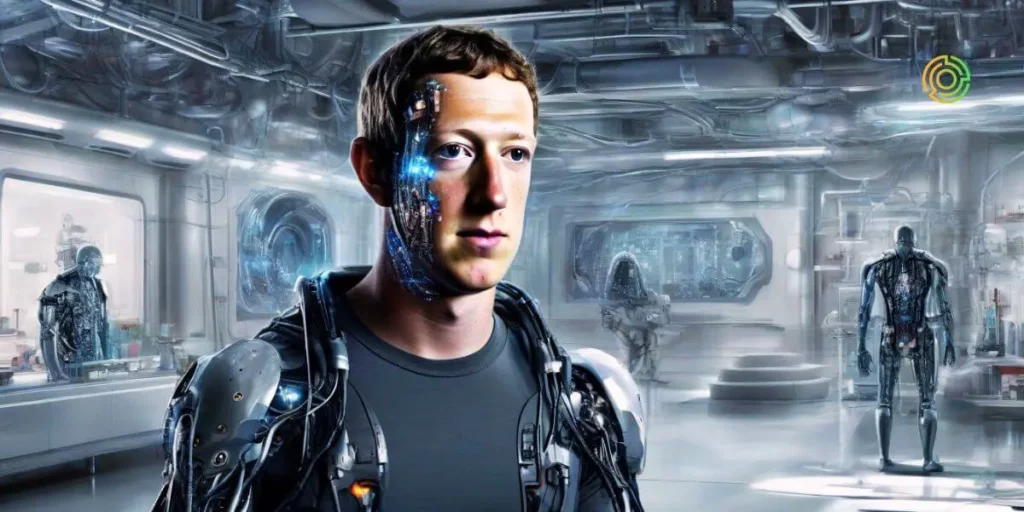The constant pursuit of technological advancements has ushered in a new era where artificial intelligence takes center stage. In this scenario, Meta, the company behind Facebook and Instagram, has announced a project that promises to revolutionize the field: the construction of a artificial general intelligence. What does this ambitious project truly entail? In this article, we will explore the details behind Mark Zuckerberg’s vision and how it compares to the previous developments by OpenAI.
The Genesis of General AI
The concept of general artificial intelligence is not new. OpenAI, the Californian startup, captured the world’s attention in 2022 with the launch of ChatGPT, a large-scale generative AI “chatbot.” OpenAI’s vision is to create systems that operate at levels of intelligence higher than humans in general. Meta, under the leadership of Mark Zuckerberg, has taken this idea as inspiration for its own project.
Meta vs. OpenAI: The Race for General AI
While the idea of general AI was popularized by OpenAI, Meta seeks to position itself as a relevant competitor in this field. Mark Zuckerberg has stated that his company is tirelessly working to develop a artificial general intelligence, endowing computer systems with human-like cognitive abilities.
See also: OpenAI announces ChatGPT-5 arrival date for 2024
Defining General AI
Sam Altman, director of OpenAI, defines artificial general intelligence as that which operates in programs “smarter than humans in general.” However, the lack of consensus on a precise definition is evident. Nick Clegg, Meta’s head of international affairs, acknowledged at the World Economic Forum in Davos that the computing community lacks unanimous agreement on what general AI truly entails.
Technological Race: Google, Meta, and Microsoft in Competition
The emergence of generative AI last year triggered intense competition among tech giants such as Microsoft (a key investor in OpenAI), Google, and Meta. These companies have deployed numerous tools and are competing to attract the best engineers in the field. While the technology generates enthusiasm, it has also raised concerns about job loss and risks to humanity.
Gradual Approach by OpenAI and Meta
Despite the concerns, both OpenAI and Meta are committed to addressing the development of artificial general intelligence gradually. OpenAI, in particular, has expressed its intention to benefit humanity through the large-scale use of computer models to detect and rectify problems. Sam Altman, at the World Economic Forum, mentioned that someday they will create something considered general AI, predicting that the world will experience a brief panic before returning to normalcy.
Conclusion
In summary, Meta’s next project to build a artificial general intelligence reflects the constant evolution of technology. Competition among tech giants drives innovation, though it also poses ethical and labor challenges. As we move towards a more automated and intelligent future, it is crucial to understand and address the impacts of these technological developments.
See also: ChatGPT Access for Less: Unlocking the Power of AI on a Budget
FAQs
Q1: What is Meta’s current focus in the realm of artificial intelligence?
A: Meta, the company behind Facebook and Instagram, is currently shifting its focus towards the development of a artificial general intelligence. Mark Zuckerberg, the CEO, has expressed the ambition to create a system with cognitive capabilities comparable to human intelligence.
Q2: How does Meta’s project differ from OpenAI’s ChatGPT?
A: While both Meta and OpenAI aim for artificial general intelligence, the approach and emphasis may differ. Meta’s project is driven by the vision to match developments by OpenAI and position itself as a major player in the field.
Q3: What is the definition of artificial general intelligence?
A: General Artificial Intelligence, according to Sam Altman, director of OpenAI, refers to systems that operate in programs “smarter than humans in general.” However, there is currently no unanimous consensus within the computing community about the precise definition.
Q4: How is the competition shaping up in the technological race for AI development?
A: The emergence of generative AI has triggered fierce competition among tech giants such as Google, Meta, and Microsoft. They are deploying various tools and vying for top engineers in the field to spearhead advancements in artificial intelligence.
Q5: Are there concerns about the impact of AI development on employment?
A: Yes, there are concerns about the potential loss of jobs due to advancements in AI technology. As the race for artificial general intelligence intensifies, companies are aware of the need to address ethical and labor challenges associated with these developments.
Q6: How does OpenAI plan to approach the development of AI?
A: OpenAI aims to develop artificial general intelligence gradually, with the goal of benefiting humanity. They emphasize the use of large-scale computer models to detect and rectify issues, ensuring a responsible and controlled progression.
Q7: What does the future hold for AI technology, considering the ambitious projects by Meta and OpenAI?
A: The future of AI technology is dynamic and evolving. As Meta and OpenAI compete to push the boundaries of artificial general intelligence, it raises questions about the ethical implications and societal impact of these advancements.
Follow us on our social networks and keep up to date with everything that happens in the Metaverse!
Twitter Linkedin Facebook Telegram Instagram Google News Amazon Store
Recent Posts
- AI and Autonomous Vehicles: The Road to Self-Driving Cars
- Best Crypto Exchanges with lowest fees in 2025
- How to accept Bitcoin Payments and other Cryptocurrency as a Business
- Metaverse Fashion Week 2025: Global Designers Challenge Borders, Identity, and the Limits of Physical Fashion
- Elon Musk’s AI platform — Presentation of New AI Assistant from ArbitrageScanner. Traders review

